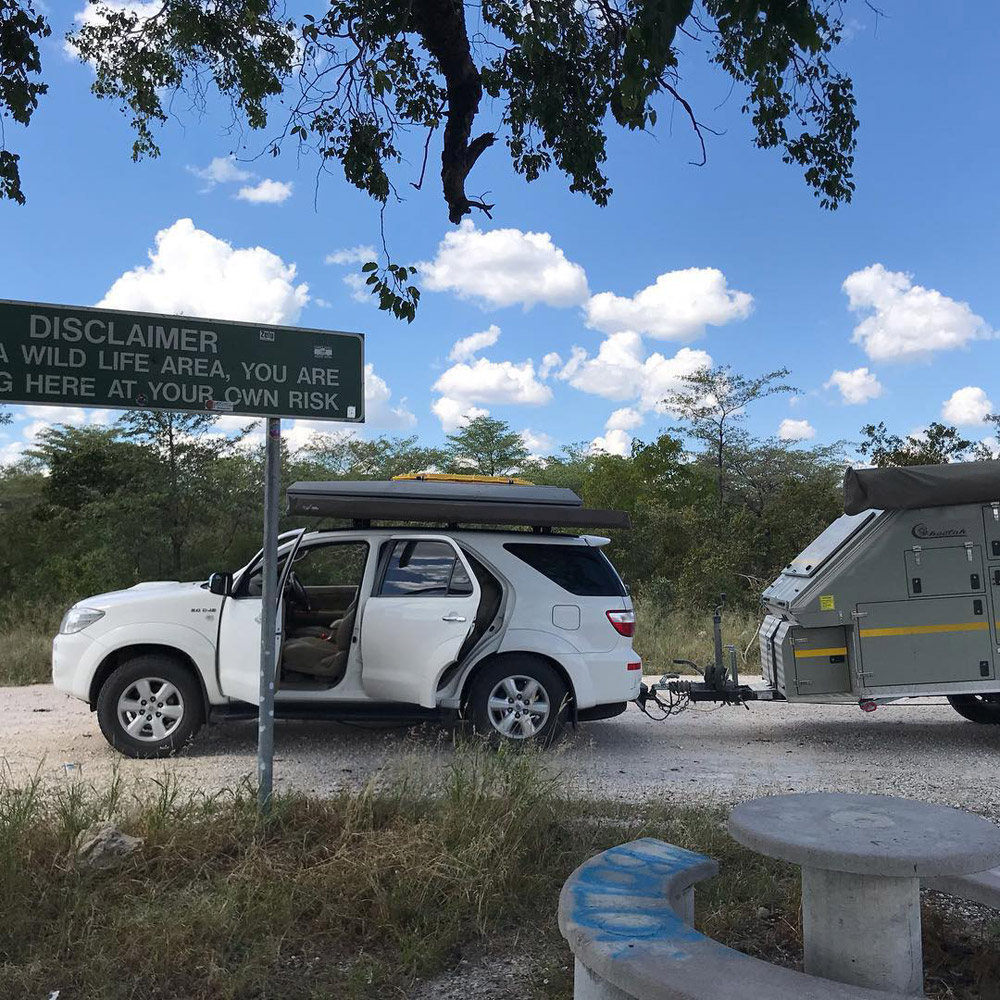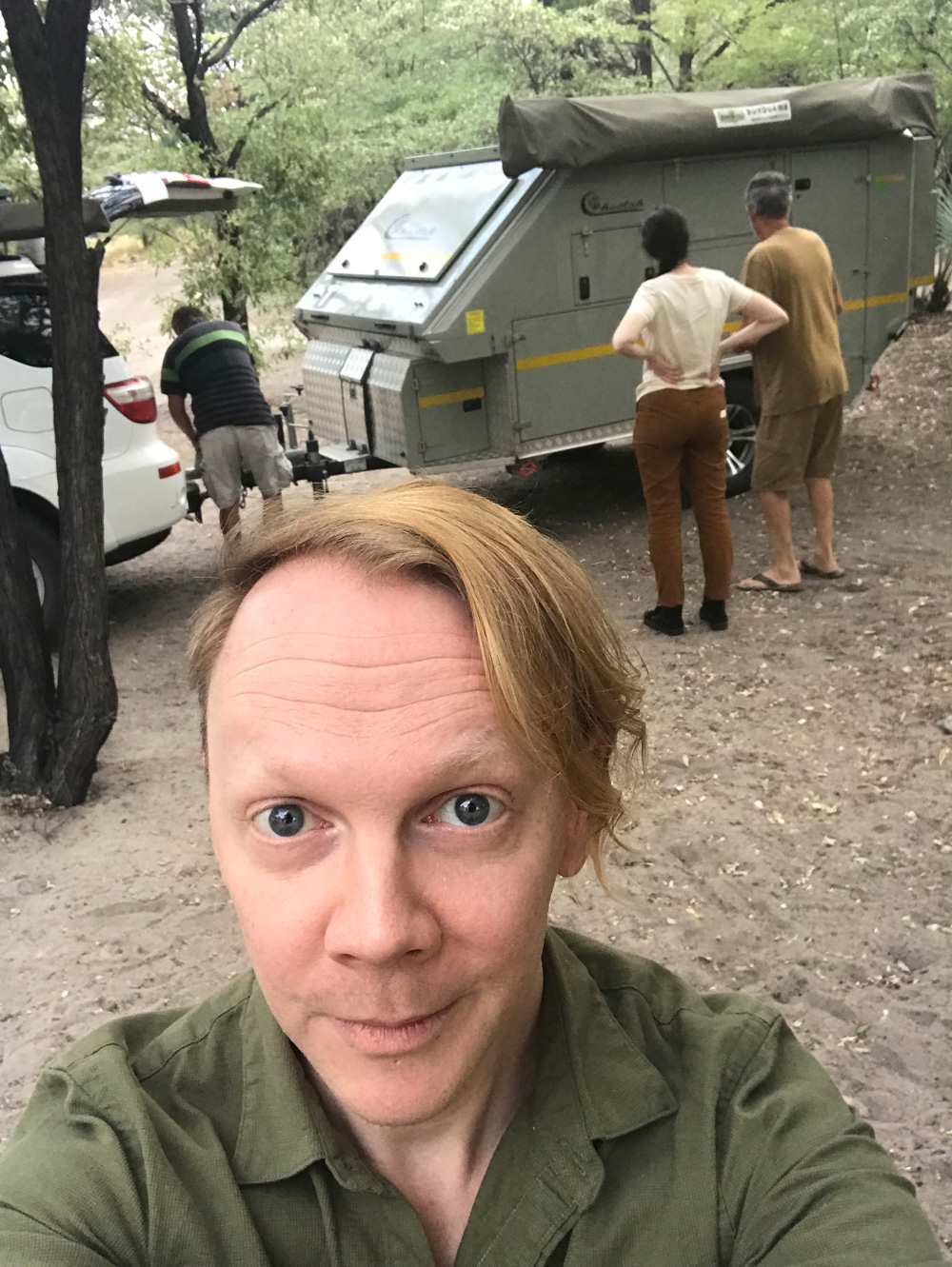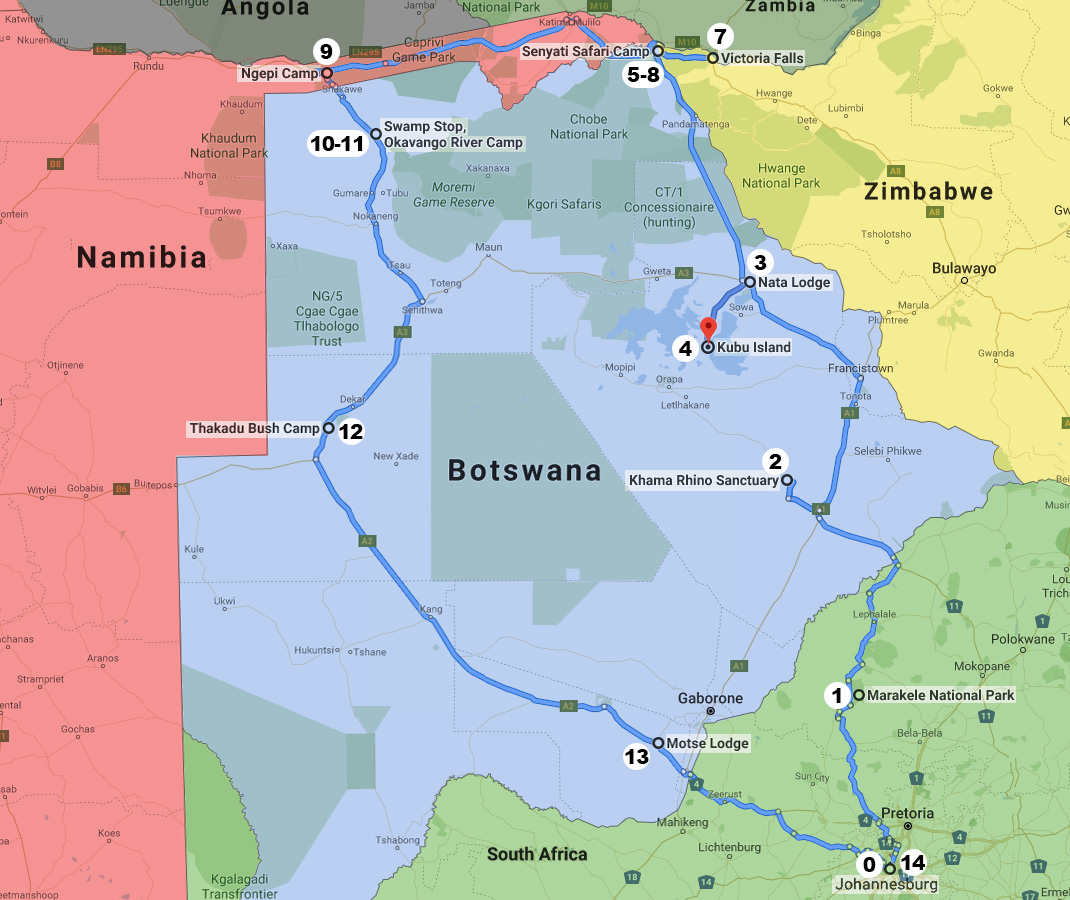My Africa camping/safari trip — FAQ
Here are the questions a million people asked me about after my trip!
What did you need to pack?
I wrote a whole article about this, with tons of helpful links; check it out! This combines the packing considerations for both camping in Africa and going on safari in general. Read more...
How did you not get sunburned????
I'm deathly pale and I get sunburned way too easily, so I was extremely careful in planning a stategy for shopping/packing before my trip and protecting myself from the sun at all times while in Africa. I wrote a whole article about it; it's here!
How safe did you feel, with regard to animals?
Mostly pretty safe! Going on safari comes with a really exhilarating, thrilling, sometimes-slightly-scary feeling when you're close to the animals. Most of the time you feel like you're at a very safe distance, and then once in a while things get a little tense. I'll give you an example: In Chobe National Park, we were driving on a very narrow dirt road with thick trees on both sides. Way in the distance, we saw a few elephants crossing the road, so we stopped and let them pass. When we thought they were done, we advanced, and suddenly more elephants started crossing in front of us, and more were crossing behind us! It was a large herd, and we'd driven right into the middle of them! We couldn't move, and we were a little too close to a large male and female and their baby. The large male turned toward us to challenge us with his pre-charge beahavior; tense posture, and flapping his ears at us. He was about five meters away from us, and we had to quickly drive in reverse to give him the space to not feel threatened by us, knowing that we were driving backward toward where more elephants were trying to cross the road. In the end, it was a brief moment of panic, but nothing happened. This is a pretty typical experience.
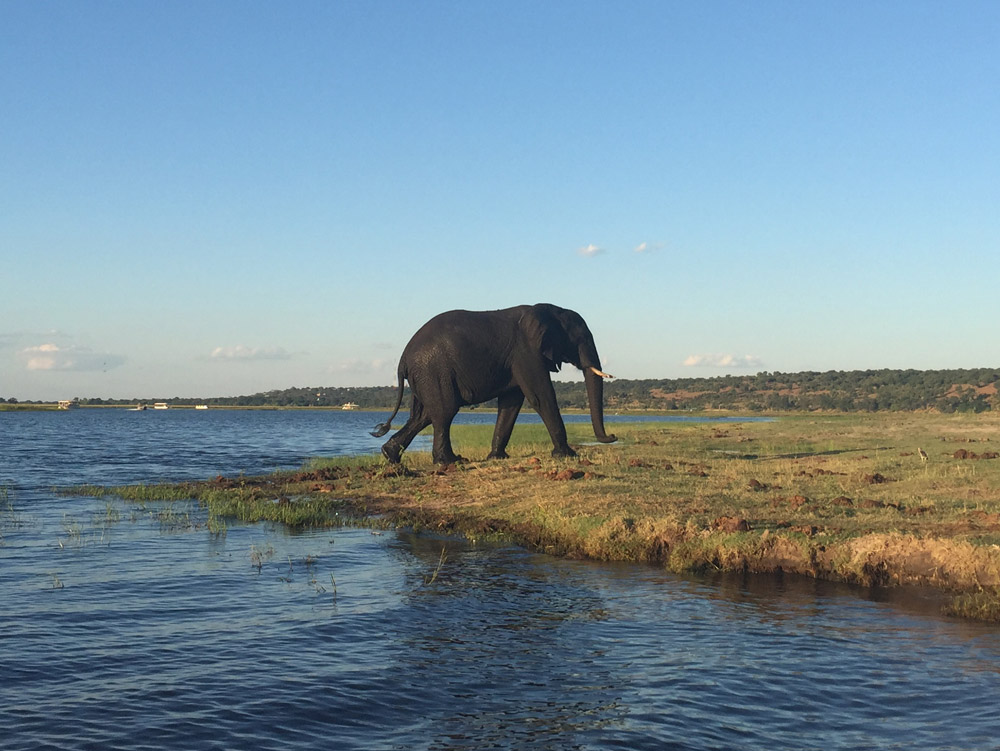
We watched this elephant swim across the river during our boat tour of the Chobe River — photo by Pascal
Now, camping at night was another story! In many of our campgrounds we heard animal noises all night — elephants trumpeting and fighting, hyenas howling, large trees rustling right by our campsite as something(?) pushed its way through, and one night we were woken up by a lion, probably far away, doing a pretty scary-sounding repeated grunt-growl thing for a minute or two. Hearing these large animals at night and knowing we were sleeping in a big exposed metal box — with nothing but canvas and screen walls to protect us — was a little nerve-wracking, but of course we were fine. Some of these campgrounds have fences around them, and some do not. They all have security guys walking the perimeter at night; more on that in a bit.
One of our campgrounds had baboons walking and running right through the camp during the day, and that was a little scary to see. Some of the campgrounds have vervet monkeys running around, but they're not really dangerous; you just have to be careful not to leave anything laying around that they can steal.
Some of the camps had warning signs about scorpions and snakes, and that definitely made me nervous a lot of the time, but we were fine. I was a little bit obsessive about checking behind every door for snakes whenever I went into any of the restroom/shower buildings. And one camp had a sign warning us to check our bedding for scorpions every night, so you can bet we did! Fortunately we were all good.
For a trip like this, you have to accept and embrace the fact that these animals are everywhere, and you're entering their world, sharing their space. If you're respectful and careful of course you'll be fine.
How safe did you feel, with regard to people?
100% safe. Everywhere we went, people were lovely; polite, respectful, helpful, and in many cases very warm and kind. I'd been warned about Johannesburg being pretty rough, but we didn't spend any time there, and even if we had, I wouldn't let myself worry about it. Of course it's important to be careful, read up on safety wherever you go, etc, but I really believe you have to travel with an open heart, and if you're kind and respectful to people they're almost always kind and respectful back. One piece of advice: greet everyone you meet — at the airport, at border crossings, at campgrounds, at parks, at restaurants — with a smile and a warm hello. Not all tourists are friendly, some of the people working in these industries (as well as strangers on the street) can be a little bit shy or guarded when dealing with foreign tourists. If you show people right off the bat that you're friendly, they really let their guard down a lot of the time.
Did you need to get any vaccinations?
Not for the countries we visited. In researching all of this before our trip, I found a few contradicting things online — some websites said no vaccinations were required for the four countries we were visiting: South Africa, Botswana, Namibia, and Zimbabwe. Some websites said we'd need to get vaccinatinated for yellow fever, and I read that for certain border crossings in Africa you have to show a certificate of vaccination for certain diseases. However, we were informed by our guide, David, that we wouldn't need any of this for our trip, and we deferred to him since he's been doing this for years. And it was no problem; no one ever asked us about vaccinations during our many border crossings, and I'm counting on my fingers here... counting our arrival in Johannesburg, and all the driving over borders that we did, we crossed borders and had to show our passports about eight times.
At some border crossings, a person will take your temperature by pointing a little hand-held electrical device at your forehead. This is weird but you get used to it! They're just trying to make sure you're not coming into the country with a high fever, which might indicate a serious disease like yellow fever. Early in our trip my wife actually had a bit of a fever that she brought with her from New York, and she was terrified that she'd set off the machine and get quarantined, but luckily this never happened; they scanned her and she was fine. So I think you'd have to be running a really high fever to have a problem.
Anything else to know about border crossings?
While I'm talking about border crossings and health/safety, one other weird thing we encountered was, at certain border crossings, everyone had to get out of the vehicle and walk through a shallow puddle of a disinfectant chemical, to make sure we weren't carrying any livestock diseases on our shoes. Vehicles also have to slowly drive through a bigger puddle of this stuff, to disinfect the tires. Sometimes this happened at random checkpoints on the highway, not even at a border.
Anyway, a couple things to note when this comes up: Although the puddle is very shallow (like less than inch), you might not want to be wearing fli-flops for this, as the liquid will probably get on your feet. It won't do you any harm, but it'll feel pretty gross, and the liquid definitey looks gross since a million people have already walked through it with dirty shoes. Secondly: When you get out of your vehicle to walk through the puddle, you're also supposed to bring any additional shoes you have with you, so you can dunk them in the chemical as well. The border guards might not check your vehicle for additional shoes, but in my opinion it's important to respect this rule because they really are trying to protect the livestock in their country/region, which is of course a hugely important part of their livelihood. You'll see livestock grazing all around the roads in Africa — cows, goats, donkeys, horses, etc — so even if you're not visiting a farm, there's a good chance you've been walking through areas where animals have grazed, and there is a possibility you're carrying microbes on your the soles of your shoes.
A couple other things about border crossings: For all crossings, you'll need to go into one office to get a stamp in your passport showing that you're leaving that country, and then you'll drive a couple dozen meters over the border and go into the next building where you'll get a stamp showing that you've entered that country. So it'll help to keep your passport handy for this whole process. I also recommend keeping a pen on you at all times, and I always keep a small notepad handy to use as a hard surface to write on. Some border crossings will require you to fill out a brief form while you wait, while others don't. They often don't provide pens and there may not be a counter to lean on, so it'll be much easier if each person brings their own.
That's all you'll need for most border crossings: your passport and a pen. However, there was one border where we had to pay to cross: From Botswana into Zimbabwe, and this is almost certainly designed around the fact that tourists are crossing into Zimbabwe specifically to take a day trip to Victoria Falls. I believe the price may be different depending on what country you're from, but for my group of French and American visitors, we had to pay $30 USD for the crossing into Zimbabwe. We paid this in US dollars, and I was advised by a Canadian I met who lives in Botswana that only US bills dated 2006 or later are accepted, so that's something you can check on your bills before you go!
The Zimbabwe visa is a big sticker that takes up a whole page of your passport; they'll paste it right in there. So make sure you have at least one totally clear page in your passport for this. I didn't run into this problem in Zimbabwe, but I did have a problem in France a few years ago where they needed to paste in my one-year visa visiteur and it turned out I didn't have any blank pages! Yikes! I had to run to the US embassy in Paris and get a little booklet of new pages stapled into my passport; who even knew that was a thing?
Anyway, for all the other border crossings in South Africa, Botswana, and Namibia, it was just a normal little ink stamp that takes up a small portion of a page.
What kind of physical activity is required for a camping/safari trip like this?
Nothing too major, and in fact a little bit less than I'd mentally prepared myself for. When I pictured Africa and camping, I don't know why but I imagined some degree of physical exertion every day, like we were going to be building the railroad or looking for Dr Livingstone or something. It turned out to be physically pretty easy most of the time. Here are the main things to be aware of:
In our case, we had to help set up our campsite every afternoon/evening, and this meant helping to open up and set up the Cheetah camper, which takes about an hour and involves a small amount of physical effort, which might wear you out a little bit in extreme heat. The Cheetah involves lots of unlatching things, sliding things open, unfolding things, zipping things up, etc. Nothing super heavy or difficult. There are tables and chairs to unfold and set up outside, cables to plug in, etc. This is all pretty fun, actually! Then there's stuff like foraging for firewood, collecting fist-sized rocks to make a fire pit, and stuff like that. Most nights we'd pack up all the dishes in a big bucket and haul them over to a sink to clean them. None of this was very physically demanding for me and my group.
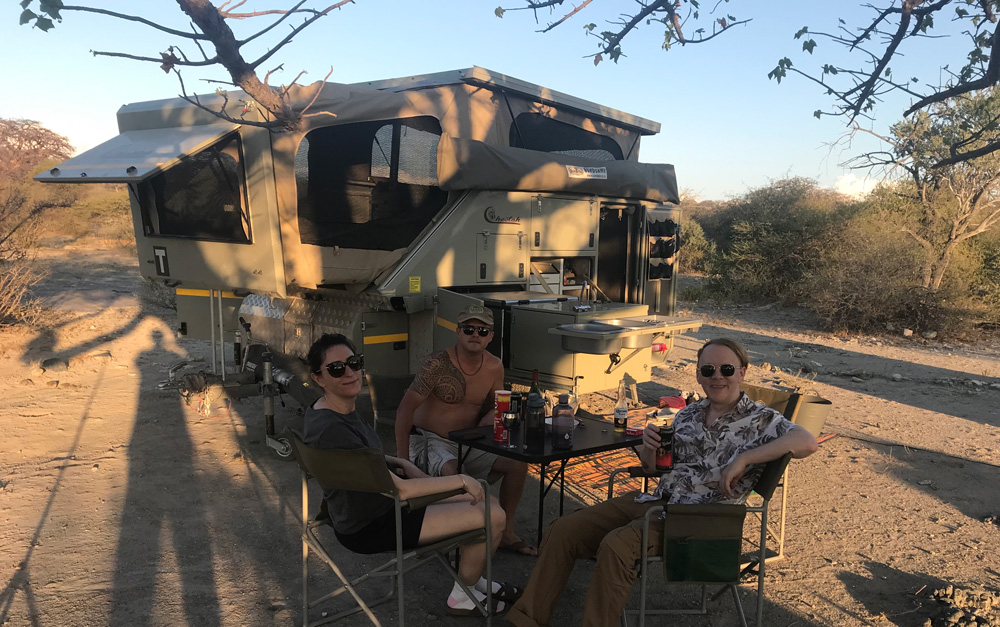
Kubu Island, I'm pretending I feel fine after shoveling donkey shit out of our campsite in 43°C (109.4°F) heat.
Of course, we also had to break down and pack up the campsite almost every morning, do the dishes after breakfast, etc. It was almost always nice and cool in the mornings, so all of this was a pleasure.
We didn't do nearly as much walking and hiking as I expected during the whole trip. In the US I'm used to going on long hikes, for up to 6 hours at a time and maybe up to 8 miles or so. We never did anything remotely that hard during our Africa trip. All of our safari time was in the SUV, and outside of that we only went on a handful of walks: one was an easy hike up some rocky hills on Kubu Island, which took less than hour round-trip; another was the game walk we did with a group of San people in Thakadu Bush Camp, which was somewhat rocky but totally flat and involved less than a mile of walking — and the last was the walk around Victoria Falls, which was less than a mile of walking on somewhat steep but totally paved footpaths.
That's about it for physical activity and exertion! No slashing through the bush with a machete, no wrestling crocodiles, etc.
What were the campground facilities like?
For the most part, much nicer than I'd pictured for this trip! We stayed at nine campgrounds during our two-week trip. Some of our campsites felt just like a campground in the US; we had neighbors we could see in campsites on either side, there were lights on the paths, etc. (Some examples of this: Senyati Safari Camp, Sepopa Swamp Stop.) On the other hand, some of our campsites felt very remote! I'm talking, no neighbors visible anywhere, no lights anywhere, and the campsite was basically just a plot of dirt. I preferred these! (Some examples of this kind of campsite: Kubu Island, Thakadu Bush Camp.)
Here's some info on the facilities we got used to having in most places...
Showers/restrooms — All but one of our campgrounds had big shower rooms and restrooms with private stalls and hot and cold water (Kubu Island being the exception; no running water, period). One campground, Senyati Safari Camp, actually had private bathrooms and showers for each campsite!
Sink — Almost all of our campsites had a sink to do dishes and wash clothes, either right in the campsite or outside the communal shower rooms.
Electricty — All but one of our campsites had an electrical post to plug our vehicles into (Khama Rhino Sanctuary being the exception there). The big portable battery we carried in the back of the SUV had enough juice for us to survive a night without being able to plug in; we were able to power our camper's lights through that with no problem.
Laundry — Several of the campgrounds offered laundry services, where you drop off a bag of clothes at the front desk and pay a fee, and then you pick up your clean clothes the next day.
Wifi — Most of the campgrounds had wifi at their front offices, but I really tried to avoid using it.
Tours and activities — Many of the campgrounds could arrange tours for you at the reception office — safari tours by jeep/minibus (although we didn't need this because we did our own safaris in our guide's SUV), boat tours, and even helicopter rides. At Thakadu Bush Camp our guide David signed us up for a "game walk" in the bush with a group of local San people.
Restaurants/bars — Some of the nicer campgrounds had a restaurant and bar right at the reception office. These restaurants and bars are somewhat simple and rustic but you can totally get a good hot meal and a bunch of refreshing drinks.
Security — All of the campgrounds where we stayed had a security patrol of men on foot who walked around the campground at night to keep an eye out for dangerous animals and, I guess, any suspicious activity, but we really never felt like crime would be a problem in any of the places we visited. Most times the security guards would stop by our campsite early in the evening and introduce themselves, so we wouldn't be worried when we saw them passing by our campsite with flashlights in the middle of the night. It was always nice to meet them and chat with them! Man, I want that job.
How much were you "roughing it" out there?
I'd love to brag that we were totally roughing it the whole time, but in reality we really had a lot of comfort and convenience throughout our camping trip.
The Cheetah camper that we slept in every night offered lots of comfort and convenience. We slept extremely well in the Cheetah; the bed was firm, spacious, and very comfortable for two people (plus there's a whole other bed we didn't use). We had a fridge/freezer right in the Cheetah (and a second fridge in the SUV) so we were able to bring lots of good food to cook; no granola bars or peanut butter sandwiches for this trip.
We had an espresso machine(!) and we were able to boil a pot of water every morning, so we always had tea and coffee. The fridge in the SUV was stocked with lots of beer and wine, and we were able to grill meat and/or fish every night, either over our campfire, or in some cases our campsites had a proper grill we could use.
What was your travel itinerary like?
My wife and I live in Brooklyn (New York), so we flew overnight from New York to Paris, enjoyed a nice afternoon layover in Paris, and then took a second overnight flight to Johannesburg.
Our guide, David, picked us up at the airport in Johannesburg, and then the rest of our trip was all driving, with David at the wheel. Here's a map (below) of our overall trajectory in Africa, with numbers I added to mark where we stayed each night. You can see how we started and ended in Johannesburg and traveled in a big loop, mostly though Botswana, with shorter excursions into Zimbabwe and Namibia.
And then of course at the end of our trip we arrived back in Johannesburg, headed right to the airport, took an overnight flight back to Paris, followed immediately by a flight home to New York. It felt crazy being in a noisy/crowded airport again! Talk about a culture shock after two weeks in the bush!
Next: More pics from my trip!
Quick links
- My Africa trip: home
- Our accommodations and set-up
- Summary and itinerary, week 1
- Summary and itinerary, week 2
- Shopping and packing for camping and safari in Africa
- Pale person success story: I went camping in Africa for two weeks and didn't get sunburned!
- FAQs about my Africa camping/safari trip
- More pics from my trip
- IKAMU website | (English version)
- IKAMU Facebook page
- Back to Cool Stuff in Paris

